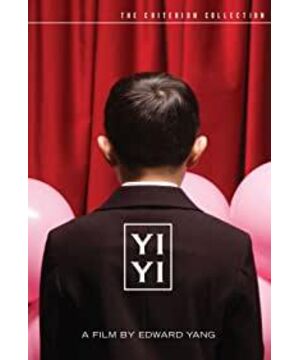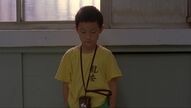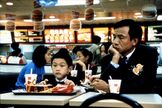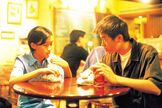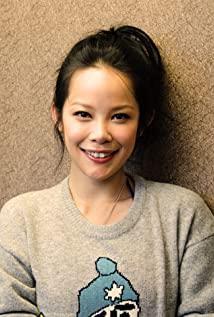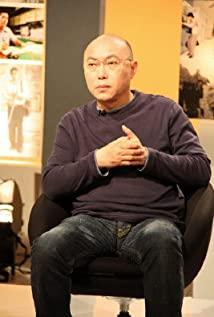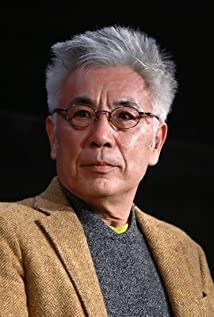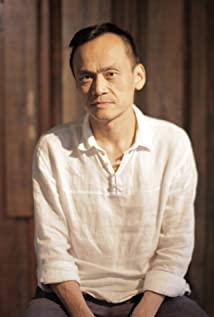It was only one hundred and seventy-three minutes, but when the faint tunes at the end of the film and the slow subtitles slowly flowed, it seemed that what kind of life I lived was finished in these three hours. This is a movie four years ago, very soft. But if I watched it then, I was destined to be incomprehensible. And now, I was surprised and sad to see a lot of myself in it. This kind of feeling is like seeing my nephew Yangyang's photo taken on the back of his head—"You can't see it yourself, so I'll take it for you." 1. Blocking Jian Nanjun at home for a long time, suddenly asked himself: "Hey, what am I going to get when I come back?" His old classmate got down from the elevator and went up with him again. The door closed suddenly: "Huh. , What am I going to do?” Maybe only when life is blocked by sudden events, people will stop to think about the meaning of life, weigh their original goals and current situation. Jian Nanjun's blockage stems from business failures. Traditionally, he is incompatible with the rapidly expanding business culture. A reunion with his first love made him experience a difficult struggle. He left her because it was difficult to wrong his pursuit to meet his lover's expectations, but many years later he found sadly that his current living condition was exactly what his first lover had hoped. If this is the case after all, if there is a second time in life, why separate? But when he said to her "I have never loved another person", he had no choice. Jian's wife's blockage stems from confiding in the vegetative mother. She found that she told her mother exactly the same every day. What to do in the morning, what to do in the afternoon, and what to do in the evening, in a few minutes. "Why do I only have so few. I feel like I have lived in vain. I am like a fool every day, what am I doing every day?" So she chose to go to the mountain to practice Buddha. But apart from being asked by the monks to pay cheques and listening to the same preaching every day, after returning home, she found that there was no difference. But she began to feel that this whole lot is really not that complicated. Jane, who hadn't entered the mountain, understood the same. He told her, "I had a chance to go there when you were away, a period of time when I was young. I thought that if I live again, there might be something different. The result... is still the same, no difference. It's just that. Suddenly I feel that if I live again, it seems...It's really unnecessary, really unnecessary." Second, love Tingting's first love is tragic. Like many others Like broken love, the first love letter, holding hands for the first time, kissing for the first time, until the first breakup. She didn't understand why this happened, why the world was not as fair as she thought. But the fat man who betrayed her was the most tragic. Even when he said such beautiful words, it sounded like a tragedy-"There is no cloud, no tree, it is not beautiful." The only one who died was the English teacher who kept saying sorry but had an affair with the students. He died at the hands of the fat man. Di's marriage continued throughout the fight between the two women. It’s just that Adi, who is constantly making money and losing money, will cry before the video of his newborn child being sleepy. Father and daughter, respectively in Tokyo and Taipei, held the hand of the first love at the same time. The Japanese businessman said to Jian Nanjun's first love girlfriend, you are his Music. 3. The youngest son of Jian Nanjun, who is less than ten years old, Yangyang has a whole movie alive. He is a thin and reticent boy, but full of the most authentic and fresh vitality of life. His appearance is also full of frustration-there are always girls who bully him for no reason, and the director insists that his balloon is a condom. But he always gives people hope, and he can always fight back whatever hits him. His actions are direct, effective, and targeted. When he started to have a good impression of a tall girl who always bullied him, because of her love of swimming, he began to practice holding his breath in the bathroom, and finally bravely jumped into the swimming pool that we thought had swallowed him. But is action the way to find meaning in life? Doesn’t the confusion of Jian Nanjun, who is in his middle age, come from his rash actions at the beginning? In an instant, Yang Yang gave us hope—he crawled out of the swimming pool that we all thought had flooded him, and returned home wet; but in an instant, he made us suspicious—at the end of the film, Yang Yang was finally willing to speak to his mother-in-law, But in front of the mother-in-law’s spirit, he said: "I miss you so much. Especially when I see that little cousin who has no name yet, I will think of you. You often tell me: You are old. I really want to tell him. I think...I'm getting old too." Maybe the dilemma that life constantly creates will eventually consume this natural vitality sadly. 4. Ways I have lived in Xiamen for five years. I am familiar with the Hokkien dialect and the way people interact. However, I never thought that Hokkien dialect can also express emotions in this way. In addition, in this film, Yang Dechang uses a three-dimensional one with many things. A narrative structure in which emotions occur at the same time. In order to achieve such a sense of hierarchy, he still uses Du Duzhi's recording. We can hear the subtle relationships of direction, time sequence, distance of characters and so on from the sound. Although I don't have a good device to work with, I can still enjoy some of it. The whole story is faintly gloomy. Yang Dechang tells us sadly about people's confusion, about life, about love, about tradition, and about morality. In fact, he is also confused behind the scenes: no one in this world knows what he wants. And what is happiness, how can we get happiness, is it really happiness?
View more about Yi Yi: A One and a Two... reviews


